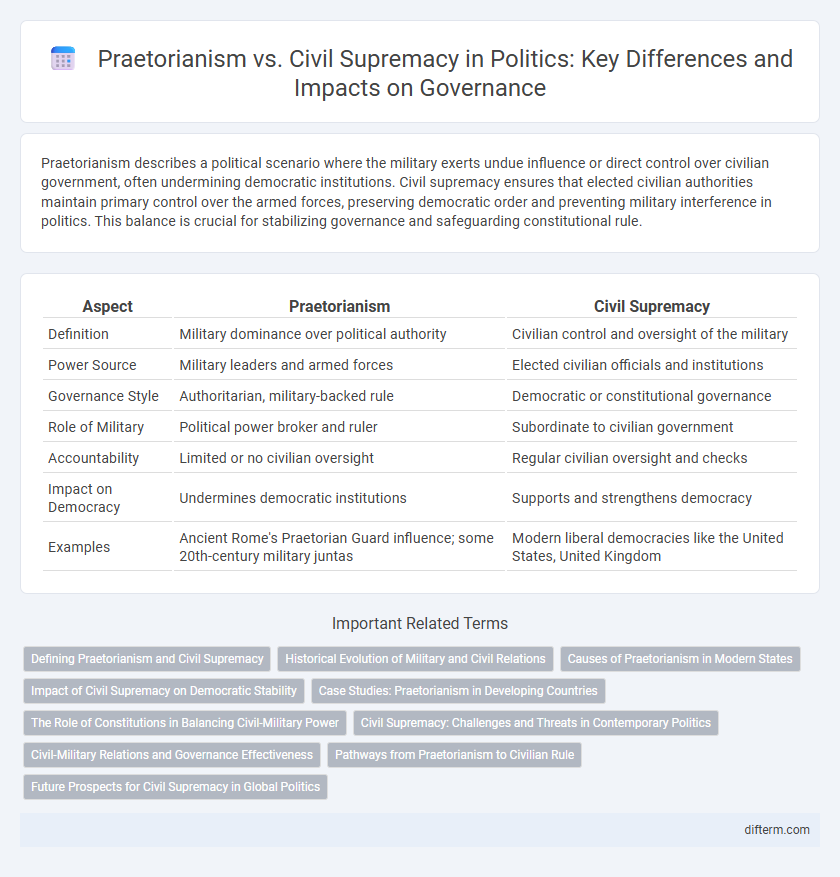Praetorianism describes a political scenario where the military exerts undue influence or direct control over civilian government, often undermining democratic institutions. Civil supremacy ensures that elected civilian authorities maintain primary control over the armed forces, preserving democratic order and preventing military interference in politics. This balance is crucial for stabilizing governance and safeguarding constitutional rule.
Table of Comparison
| Aspect | Praetorianism | Civil Supremacy |
|---|---|---|
| Definition | Military dominance over political authority | Civilian control and oversight of the military |
| Power Source | Military leaders and armed forces | Elected civilian officials and institutions |
| Governance Style | Authoritarian, military-backed rule | Democratic or constitutional governance |
| Role of Military | Political power broker and ruler | Subordinate to civilian government |
| Accountability | Limited or no civilian oversight | Regular civilian oversight and checks |
| Impact on Democracy | Undermines democratic institutions | Supports and strengthens democracy |
| Examples | Ancient Rome's Praetorian Guard influence; some 20th-century military juntas | Modern liberal democracies like the United States, United Kingdom |
Defining Praetorianism and Civil Supremacy
Praetorianism refers to a political system where military leaders or forces exert considerable influence or control over civilian government institutions, often undermining democratic processes. Civil supremacy denotes the principle that elected civilian authorities hold ultimate authority over the military and security forces, ensuring democratic governance and accountability. The tension between praetorianism and civil supremacy fundamentally shapes power dynamics within states and impacts institutional stability and democratic integrity.
Historical Evolution of Military and Civil Relations
The historical evolution of military and civil relations highlights a recurring tension between praetorianism, where military elites exert direct control over political systems, and civil supremacy that upholds civilian authority over armed forces. Instances of praetorianism often emerge during periods of political instability, facilitating coups and undermining democratic institutions, as seen in various 20th-century Latin American and African regimes. Conversely, the development of strong legal frameworks and institutional checks promotes civil supremacy, ensuring military subordination to elected officials and stabilizing governance structures.
Causes of Praetorianism in Modern States
Praetorianism in modern states often arises from weak institutional frameworks where military forces gain disproportionate influence over political authority, undermining civil supremacy. Economic instability, social fragmentation, and ineffective civilian leadership create power vacuums exploited by armed forces seeking to protect their interests. The lack of robust democratic institutions and constitutional safeguards facilitates the military's intervention in governance, eroding the balance between civilian control and military power.
Impact of Civil Supremacy on Democratic Stability
Civil supremacy ensures that elected civilian authorities maintain control over the military, thereby preventing praetorianism, where the armed forces interfere in political affairs. This principle strengthens democratic stability by safeguarding institutional checks and balances, promoting accountability, and upholding the rule of law. Countries with strong civil supremacy typically experience reduced risks of coups and authoritarian backslides, fostering sustained democratic governance.
Case Studies: Praetorianism in Developing Countries
Praetorianism, characterized by military interference in political affairs, frequently undermines civil supremacy in developing countries such as Nigeria, Pakistan, and Thailand. These states experience cycles of military coups that disrupt democratic institutions and centralize power within armed forces, weakening civilian control. Persistent praetorianism hampers political stability and democratic consolidation, leading to governance challenges and reduced international legitimacy.
The Role of Constitutions in Balancing Civil-Military Power
Constitutions play a crucial role in balancing civil-military power by clearly defining the authority and limitations of military institutions to prevent praetorianism, where the military dominates political decisions. By establishing civilian supremacy, constitutional frameworks ensure that elected officials maintain control over defense policies and military actions, reinforcing democratic governance. Effective constitutional provisions also provide mechanisms for accountability, safeguarding against military interference in political affairs and promoting stability within civil-military relations.
Civil Supremacy: Challenges and Threats in Contemporary Politics
Civil supremacy faces challenges from military influence and political interference that undermine democratic institutions and governance. Persistent threats include the militarization of political decisions, erosion of civilian oversight, and the rise of authoritarian tendencies fueled by praetorianism. Ensuring civilian control requires robust legal frameworks, transparent accountability mechanisms, and active civic engagement to prevent military encroachment on political power.
Civil-Military Relations and Governance Effectiveness
Civil supremacy ensures that elected civilian leaders maintain authority over the military, fostering transparent decision-making and accountability essential for democratic governance. Praetorianism, characterized by military interference or dominance in politics, often destabilizes governance structures and undermines institutional checks and balances. Effective civil-military relations, grounded in civilian control, are crucial for sustaining political stability, rule of law, and the legitimacy of state institutions.
Pathways from Praetorianism to Civilian Rule
Pathways from praetorianism to civilian rule often involve gradual institutional reforms that strengthen legal frameworks and promote political accountability, reducing military influence in governance. Successful transitions frequently depend on negotiated power-sharing agreements between military leaders and civilian politicians, fostering trust and gradual demilitarization of politics. Building independent judiciary systems and empowering civil society organizations are critical in sustaining civilian supremacy and preventing reversals to praetorian dominance.
Future Prospects for Civil Supremacy in Global Politics
Future prospects for civil supremacy in global politics hinge on strengthening democratic institutions and ensuring transparent governance to prevent praetorianism, where military influence overrides civilian control. Increasing international cooperation and promoting elite accountability can limit the military's political interference, fostering stable civilian-led governments. Technological advancements and global communication networks empower civil society, enhancing oversight and resilience against authoritarian military tendencies.
praetorianism vs civil supremacy Infographic

 difterm.com
difterm.com